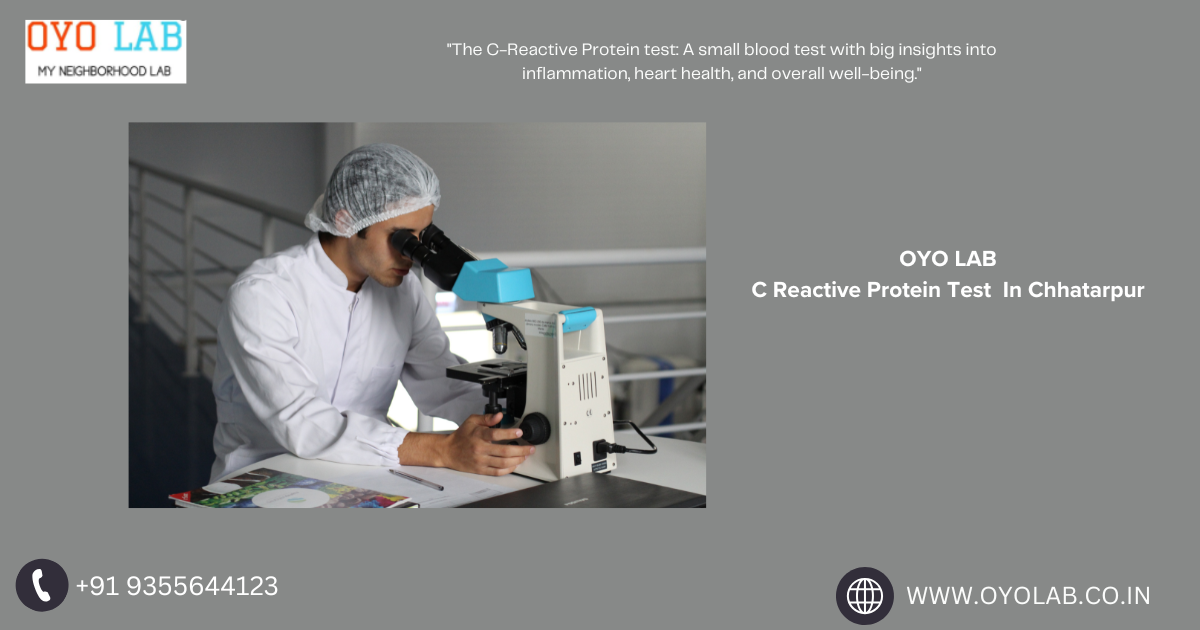
C Reactive Protein Test In Chhatarpur
By Shilpa | March 07, 2025
What Is C Reactive Protein Test ?
A C-Reactive Protein (CRP) Test is a blood test that measures the level of C-reactive protein, a substance produced by the liver in response to inflammation.
Why Is It Done?
A CRP test helps detect inflammation in the body, which can indicate:
- Infections (bacterial or viral)
- Chronic diseases (like rheumatoid arthritis or lupus)
- Heart disease risk (high CRP levels are linked to heart attacks and strokes)
- Autoimmune disorders
- Post-surgery complications
Types of CRP Tests
- Standard CRP Test – Measures high levels of inflammation (e.g., in infections and autoimmune diseases).
- High-Sensitivity CRP (hs-CRP) Test – Detects low levels of inflammation, mainly used to assess heart disease risk.
Importance Of C Reactive Protein Test
The C-Reactive Protein (CRP) test is a crucial diagnostic tool for detecting inflammation in the body. It helps doctors assess various health conditions and monitor treatment effectiveness.
1. Detects Infections and Inflammatory Conditions
- CRP levels rise in response to bacterial and viral infections, indicating an active infection.
- It helps diagnose autoimmune diseases like rheumatoid arthritis, lupus, and inflammatory bowel disease (IBD).
2. Assesses Heart Disease Risk
- The high-sensitivity CRP (hs-CRP) test measures low levels of inflammation associated with heart disease and stroke risk.
- Elevated CRP levels indicate a higher likelihood of heart attack or cardiovascular disease.
3. Monitors Chronic Diseases and Treatment
- CRP levels help doctors track the progress of chronic conditions such as arthritis and lupus.
- It is used to evaluate the effectiveness of treatments and medications.
4. Detects Post-Surgical or Medical Complications
- High CRP levels after surgery may indicate infection or complications, allowing for early intervention.
5. Helps in Diagnosing Hidden Inflammation
- Some inflammatory conditions, like chronic fatigue syndrome or metabolic disorders, may not have obvious symptoms, but CRP levels can reveal underlying inflammation.
Benefits Of C Reactive Protein Test
The C-Reactive Protein (CRP) test is a simple yet powerful tool for detecting and monitoring inflammation in the body. Here are its key benefits:
1. Early Detection of Infections & Diseases
- Helps identify bacterial and viral infections early.
- Aids in diagnosing chronic inflammatory conditions like rheumatoid arthritis, lupus, and inflammatory bowel disease (IBD).
2. Assesses Heart Disease Risk
- The high-sensitivity CRP (hs-CRP) test measures low levels of inflammation, helping predict the risk of heart attacks, strokes, and cardiovascular diseases.
- Can be used along with cholesterol tests to assess heart health.
3. Monitors Disease Progression & Treatment Effectiveness
- Helps track chronic disease activity (e.g., arthritis, autoimmune diseases).
- Evaluates how well treatments, such as medications or lifestyle changes, are working.
4. Detects Post-Surgical or Medical Complications
- Identifies infections or complications after surgery or medical procedures.
- Allows doctors to take early action if inflammation is rising.
5. Aids in Diagnosing Hidden or Unexplained Inflammation
- Useful when patients have persistent fatigue, unexplained pain, or general illness.
- Helps uncover low-grade inflammation linked to metabolic disorders, obesity, or chronic fatigue syndrome.
6. Quick, Simple & Non-Invasive
- Requires only a blood sample.
- Fast results, usually within a day.